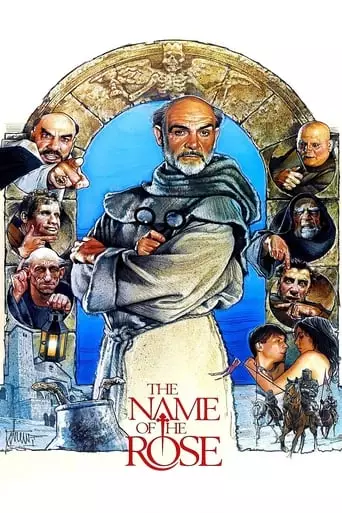
The Name of the Rose (1986) Watch Online Free
14th-century Franciscan monk William of Baskerville and his young novice arrive at a conference to find that several monks have been murdered under mysterious circumstances. To solve the crimes, William must rise up against the Church’s authority and fight the shadowy conspiracy of monastery monks using only his intelligence – which is considerable.
The Name of the Rose, directed by Jean-Jacques Annaud and based on Umberto Eco’s novel, is a medieval mystery thriller set in a remote abbey in 1327. The story follows William of Baskerville (Sean Connery), a Franciscan monk, and his young novice, Adso of Melk (Christian Slater), as they arrive at the abbey for a theological debate. Soon, a series of mysterious deaths occurs, and William is tasked with solving the mystery.
As they investigate, the pair uncovers hidden secrets about the abbey’s forbidden library, where a rare manuscript is believed to be hidden. The investigation leads to a confrontation with the Inquisition, represented by the zealot inquisitor Bernard Gui (F. Murray Abraham), and the deeper revelation of heretical ideas within the abbey’s walls.
The abbey’s enigmatic head librarian, Jorge of Burgos (Feodor Chaliapin Jr.), plays a pivotal role in concealing forbidden knowledge that has deadly consequences. The story culminates in a dramatic and fiery conclusion, where the ancient library is destroyed and the surviving characters are forced to confront the cost of uncovering truth in a repressive society.
The Name of the Rose is not just a murder mystery; it is a complex narrative about knowledge, faith, and power. One of the main themes explored is the conflict between reason and belief. William of Baskerville represents logic, deduction, and rational thought, while Jorge embodies the fear of knowledge and the dangers of unrestrained curiosity. The film also critiques the Catholic Church’s control over knowledge and its use of power during the medieval era, particularly through the Inquisition’s tactics.
Another prominent theme is the destructive potential of forbidden knowledge. The library, a metaphor for intellectual pursuit, is filled with books that are considered dangerous because they challenge the prevailing religious and political doctrines. Jorge’s decision to poison books to prevent their consumption symbolizes the dangers of knowledge being suppressed by oppressive systems.
The film also delves into the nature of heresy and the constant struggle between orthodoxy and reform. The central conflict between William and Bernard Gui represents the broader tension between reason and blind faith, making the film relevant to discussions of censorship and the authoritarian control of ideas throughout history.
After watching The Name of the Rose, you will likely feel a mix of intellectual satisfaction and emotional intrigue. The film’s complex themes of knowledge, power, and repression invite deep reflection, leaving viewers to ponder the balance between curiosity and obedience in society. The murder mystery is compelling, but it is the philosophical and theological debates that linger in your mind long after the credits roll.
The film may also evoke a sense of melancholy, particularly as it deals with the destruction of knowledge and the loss of intellectual freedom. You might feel sympathy for the characters trapped in a world where fear and authority suppress the pursuit of truth. The concluding tragedy of the library’s destruction underscores the cost of challenging established power, making the film both thought-provoking and haunting.
The Name of the Rose is a movie that resonates on multiple levels: it’s a thrilling historical mystery, a profound philosophical inquiry, and a critical commentary on the dangers of intellectual oppression, all while offering a nuanced portrayal of the human struggle for truth.
